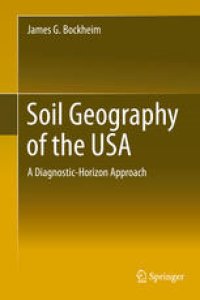
Ebook: Soil Geography of the USA: A Diagnostic-Horizon Approach
Author: James G. Bockheim (auth.)
- Genre: Geology
- Tags: Physical Geography, Soil Science & Conservation, Geomorphology
- Year: 2014
- Publisher: Springer International Publishing
- Edition: 1
- Language: English
- pdf
Since 1980, our understanding of the factors and processes governing the distribution of soils on the Earth’s surface has increased dramatically, as have the techniques for studying soil patterns. The approach used in this book relies on the National Resources Conservation Service databases to delineate the distribution of each of the eight diagnostic epipedons and 19 subsurface horizons, to identify the taxonomic level at which each of these horizons is used, to develop an understanding of the role of the factors and processes in their formation and to summarize our latest understanding of their genesis. A chapter is devoted to each diagnostic horizon (or combined horizons). This book is intended to serve as a textbook in soil geography, a reference book for geographers, ecologists and geologists and a tool for soil instructors, landlookers, mappers, classifiers and information technologists.
Since 1980, our understanding of the factors and processes governing the distribution of soils on the Earth’s surface has increased dramatically, as have the techniques for studying soil patterns. The approach used in this book relies on the National Resources Conservation Service databases to delineate the distribution of each of the eight diagnostic epipedons and 19 subsurface horizons, to identify the taxonomic level at which each of these horizons is used, to develop an understanding of the role of the factors and processes in their formation, and to summarize our latest understanding of their genesis. A chapter is devoted to each diagnostic horizon (or combined horizons). This book is intended to serve as a textbook in soil geography, a reference book for geographers, ecologists, and geologists, and a tool for soil instructors, landlookers, mappers, classifiers, and information technologists.